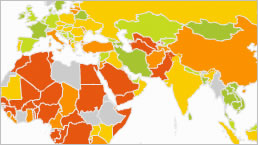04/18/2014 - 3:01 pm
The GPFI Plenary was held on October 22, 2013, in St. Petersburg, Russia, following the GPFI Forum. This by-invitation-only meeting was attended by representatives of G20 countries and non-G20 countries affiliated with the GPFI Subgroups and the Implementing Partners of the GPFI. The meeting offered an opportunity to take stock of the following achievements of the GPFI during the Russian G20 Presidency, among many others.
Data and Measurement
Building on the G20 Basic Set of Financial Inclusion Indicators, originally endorsed by the G20 at the Los Cabos Summit in Mexico in 2012 and officially launched in April 2013, under the Russian G20 Presidency, the GPFI completed the development of the G20 Financial Inclusion Indicators – a comprehensive and holistic set of financial inclusion indicators, designed to assess the state of financial inclusion in a given country. Endorsed by the G20 Leaders at their Summit in St. Petersburg in September 2013, the G20 Financial Inclusion Indicators support countries in achieving their financial inclusion goals by providing tools to measure three dimensions of financial inclusion: (i) access to financial services; (ii) usage of financial services; and (iii) the quality of service delivery.
G20 Principles for Innovative Financial Inclusion and Engagement with Standard-Setting Bodies (SSBs)
The GPFI’s work in the area of promoting G20 Principles for Innovative Financial Inclusion has focused on continuing to support developing and emerging countries to meet the commitments they have made under the Maya Declaration, in addition to supporting the mobilization of new country commitments. A total of 46 countries have now made financial inclusion commitments under the Maya Declaration. Many countries are now demonstrating strong progress toward implementation of the G20 Principles by meeting their commitments to the Maya Declaration. To provide support for the 17 countries committing to develop such strategies as well as cross-sector coordination mechanisms under the G20 Financial Inclusion Peer Learning Program, the Alliance for Financial Inclusion (AFI) has launched a Financial Inclusion Strategy Peer Learning Group, and the World Bank Group is providing technical assistance and capacity-building support through its Financial Inclusion Support Framework, launched in April 2013.
In addition, the GPFI contributed to significant progress under the Russian Presidency on promoting the consideration of financial inclusion in the work of global SSBs, consistent with their respective mandates. Highlights that were mentioned include, among others, the launch of a Financial Inclusion Workstream by the Basel Consultative Group; work of the Committee on Payment and Settlement Systems on non-banks in retail payment innovations; the Financial Action Task Force’s revised guidance on financial inclusion in 2013 as well as its new assessment methodology under which financial exclusion is incorporated as a factor to consider; the International Association of Deposit Insurers’ (IADI) paper on financial inclusion and deposit insurance; the International Association of Insurance Supervisors’ (IAIS) paper on inclusive insurance market, its inclusive insurance self-assessment program which has seen an uptake in more than 50 IAIS member jurisdictions as well as strengthening the Access to Insurance Initiative as its Implementing Partner on inclusive insurance.
The contribution of Her Majesty Queen Máxima of the Netherlands to the progress of the SSBs was acknowledged, both as the UN Secretary General’s Special Advocate for Inclusive Finance for Development and as Honorary Patron of the GPFI.
SME Finance
Progress made at the country level to address the specific challenges in access to finance faced by SMEs was noted, through the implementation of initiatives such as the SME Finance Challenge and the SME Finance Forum. The Russian G20 Presidency also saw the launch of the Women’s Finance Hub, an initiative of the G20 and GPFI to improve access to financial services for female entrepreneurs and promote the sharing of knowledge and best practices. The Women’s Finance Hub is an online platform to help advance access to finance for women-owned businesses by disseminating research and information on critical issues related to the women’s market. Other progress in deepening the analytical work and tools to foster knowledge sharing was also noted, for example the report “SME Finance: New Findings, Trends and G20/GPFI Progress,” outlining recent research on the contribution of the private sector and SMEs in particular for new job creation and investment.
Financial Consumer Protection and Financial Literacy
Integrating consumer empowerment and protection into the work of the GPFI was one of the key focus areas of the Russian G20 Presidency. The establishment of the GPFI Subgroup on Financial Consumer Protection and Financial Literacy under the Russian G20 Presidency marked a major milestone. The new Subgroup participated in the preparation of the following documents: two progress reports on women and youth developed by OECD and the World Bank; OECD/International Network for Financial Education guidance on addressing women and girls' needs for financial education and awareness; a progress report on tools to measure financial literacy and evaluate financial education programs developed by OECD and the World Bank and four related sets of tools. Other activities included a major international conference titled “Empower Consumers of Financial Products and Services through Improving Financial Literacy and Effective Consumer Protection” and contributions to the work of the GPFI Financial Inclusion Data and Measurement Subgroup and the SME Finance Subgroup.


